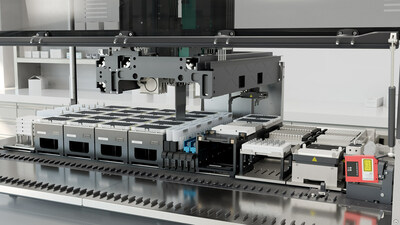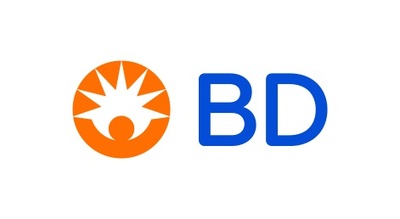BD, Hamilton Collaborate to Standardize Single-Cell Multiomics Experiments Using Robotics
- None.
- None.
Insights
The collaboration between BD and Hamilton to automate a key step in high-throughput single-cell multiomics experiments represents a strategic move to address the growing demand for efficiency and standardization in the life sciences sector. This partnership could potentially streamline workflows and reduce the time and cost associated with next-generation sequencing (NGS) library preparation, a critical component in genomics research.
From a market perspective, the adoption of automated solutions in genomics can lead to a significant expansion of research capabilities, particularly in fields like oncology and immunology. As a result, this could drive an increase in demand for BD's suite of products, potentially boosting the company's market share and revenue in the long term. By enabling larger scale studies with greater reliability, BD could also strengthen its position as a key player in the medical technology industry.
The partnership between BD and Hamilton underscores a trend in the biotechnology industry towards increased automation and the importance of intellectual property (IP) collaboration agreements. As these companies work together to develop and release new products, they will need to navigate complex IP landscapes to ensure mutual protection and benefit.
Legal considerations around patent rights, licensing agreements and potential IP disputes are paramount. The collaboration's success will partly depend on a clear legal framework that protects the proprietary technologies and methodologies involved. This could set a precedent for future collaborative efforts in the industry and may influence how emerging biotech companies approach IP in automation and multiomics.
The announcement of this collaboration could have immediate financial implications for BD and Hamilton. Investors will likely monitor the development of the BD Rhapsody™ Single-Cell Analysis Library Preparation Reagent Kits and Hamilton Microlab® NGS STAR™ applications closely, as the successful execution of this partnership may result in increased operational efficiencies and potentially enhance BD's competitive edge.
Short-term costs associated with research and development (R&D) may impact financial performance, but the long-term benefits of entering a rapidly growing market and the potential for increased sales volumes should be considered. It is crucial to evaluate the potential return on investment (ROI) from this collaboration, as it could lead to significant growth opportunities for both companies if the automated solutions are well-received by the industry.
Companies to automate a critical step of high-throughput single-cell multiomics experiments
As a result of the collaboration, BD aims to deliver a suite of BD Rhapsody™ Single-Cell Analysis Library Preparation Reagent Kits that can be performed on the Hamilton Microlab® NGS STAR™ robotic liquid-handling platform. The combination will automate steps, including pipetting and thermal cycling, to produce DNA samples or "libraries" that are ready for genetic sequencing.
In single-cell multiomics experiments, constructing libraries of fragmented genetic information that can be read by sequencing instruments is an essential first step before next-generation sequencing (NGS) can be performed and insights from cells can be gathered. NGS library preparation is historically a time-intensive process with manual steps that can result in inconsistent results and compromised data quality.
"Multiomics-based assays are increasingly used by single cell researchers in the fields of oncology, immunology and other disciplines to help investigate the various layers of information on a single cell and access a deeper view of health and disease, which is why ensuring reproducible results is critical," said Steve Conly, worldwide president at BD Biosciences. "By integrating
Matt
The BD Rhapsody™ Single-Cell Analysis Library Preparation Reagent Kits and Hamilton Microlab® NGS STAR™ applications will be developed and released in phases starting in 2024.
About BD
BD is one of the largest global medical technology companies in the world and is advancing the world of health by improving medical discovery, diagnostics and the delivery of care. The company supports the heroes on the frontlines of health care by developing innovative technology, services and solutions that help advance both clinical therapy for patients and clinical process for health care providers. BD and its more than 70,000 employees have a passion and commitment to help enhance the safety and efficiency of clinicians' care delivery process, enable laboratory scientists to accurately detect disease and advance researchers' capabilities to develop the next generation of diagnostics and therapeutics. BD has a presence in virtually every country and partners with organizations around the world to address some of the most challenging global health issues. By working in close collaboration with customers, BD can help enhance outcomes, lower costs, increase efficiencies, improve safety and expand access to health care. For more information on BD, please visit bd.com or connect with us on LinkedIn at www.linkedin.com/company/bd1/, X (formerly Twitter) @BDandCo or Instagram @becton_dickinson.
Contacts: | |
Media: | Investors: |
Troy Kirkpatrick | Adam Reiffe |
VP, Public Relations | Sr. Director, Investor Relations |
858.617.2361 | 201.847.6927 |
![]() View original content to download multimedia:https://www.prnewswire.com/news-releases/bd-hamilton-collaborate-to-standardize-single-cell-multiomics-experiments-using-robotics-302041302.html
View original content to download multimedia:https://www.prnewswire.com/news-releases/bd-hamilton-collaborate-to-standardize-single-cell-multiomics-experiments-using-robotics-302041302.html
SOURCE BD (Becton, Dickinson and Company)
FAQ
What is the collaboration agreement announced by BD?
What is the goal of the collaboration?








